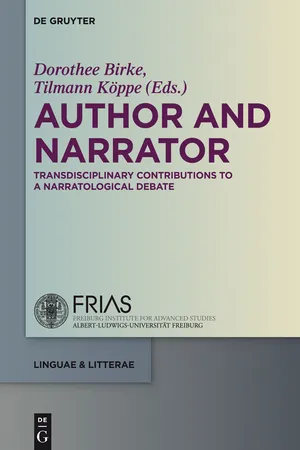
Author and Narrator
Transdisciplinary Contributions to a Narratological Debate
- 280 pages
- English
- ePUB (mobile friendly)
- Available on iOS & Android
Author and Narrator
Transdisciplinary Contributions to a Narratological Debate
About this book
The linguae& litterae series, edited by Peter Auer, Gesa von Essen and Werner Frick, documents the research activities of the School of Languageand Literature of the Freiburg Institute for Advanced Studies (FRIAS). These research activities in literary studies and linguistics are characterized by an approach that is theoretically and methodologically "state of the art" and interdisciplinarily open.
In linguistics the accent is on the corpus-based, quantitative and qualitative investigation of language; in literary studies the focus is on the comparative, transdisciplinary analysis of literary phenomena in their cultural contexts. At the same time the series deals with the productive interfaces and synergies between modern linguistics and literary studies (as well as the humanities, social and natural sciences with which they interact). It seeks a new, contemporary reformulation of the humanities research curriculum and its problem and concept orientation for the future.
The series has a clear international orientation - each volume is multilingual, containing German, English and French contributions and, depending on the volume, articles in Italian or Spanish as well. Each individual volume is peer reviewed by an international editorial board.
Each year 2-4 volumes are published.
Frequently asked questions
- Essential is ideal for learners and professionals who enjoy exploring a wide range of subjects. Access the Essential Library with 800,000+ trusted titles and best-sellers across business, personal growth, and the humanities. Includes unlimited reading time and Standard Read Aloud voice.
- Complete: Perfect for advanced learners and researchers needing full, unrestricted access. Unlock 1.4M+ books across hundreds of subjects, including academic and specialized titles. The Complete Plan also includes advanced features like Premium Read Aloud and Research Assistant.
Please note we cannot support devices running on iOS 13 and Android 7 or earlier. Learn more about using the app.
Information
Index
Table of contents
- linguae & litterae
- Title Page
- Copyright Page
- Table of Contents
- Author and Narrator: Problems in the Constitution and Interpretation of Fictional Narrative
- Against Pragmatic Arguments for Pan-Narrator Theories: The Case of Hawthorne’s “Rappaccini’s Daughter”
- Narratorless Narration? Some Reflections on the Arguments For and Against the Ubiquity of Narrators in Fictional Narration
- Author and Narrator: Observations on Die Wahlverwandtschaften
- Author, Authority, and ‘Authorial Narration’: The Eighteenth-Century English Novel as a Test Case
- Interpretive Problems with Author, Self-Fashioning, and Narrator: The Controversy Over Christian Kracht’s Novel Imperium
- Fictional Narrators and Creationism
- Speakers and Narrators
- Serious Speech Acts in Fictional Works
- Author and Narrator in Lyric Poetry
- Narrative Mediation in Comics: Narrative Instances and Narrative Levels in Pau lHornschemeier’s The Three Paradoxes
- Narrator and Author: A Selected Bibliography
- Notes on Contributors
- Index